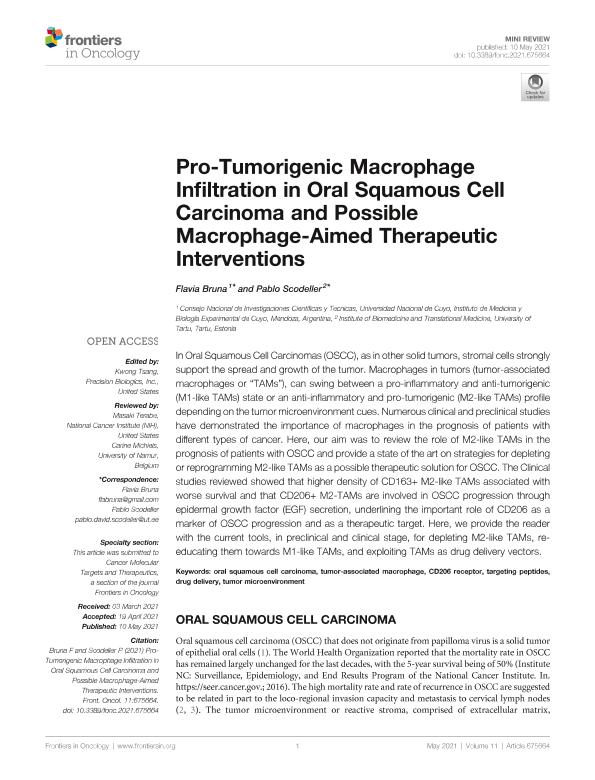Artículo
Pro-tumorigenic macrophage infiltration in oral squamous cell carcinoma and possible macrophage-aimed therapeutic interventions
Fecha de publicación:
05/2021
Editorial:
Frontiers Media
Revista:
Frontiers in Oncology
e-ISSN:
2234-943X
Idioma:
Inglés
Tipo de recurso:
Artículo publicado
Clasificación temática:
Resumen
In Oral Squamous Cell Carcinomas (OSCC), as in other solid tumors, stromal cells strongly support the spread and growth of the tumor. Macrophages in tumors (tumor-associated macrophages or “TAMs”), can swing between a pro-inflammatory and anti-tumorigenic (M1-like TAMs) state or an anti‐inflammatory and pro-tumorigenic (M2-like TAMs) profile depending on the tumor microenvironment cues. Numerous clinical and preclinical studies have demonstrated the importance of macrophages in the prognosis of patients with different types of cancer. Here, our aim was to review the role of M2-like TAMs in the prognosis of patients with OSCC and provide a state of the art on strategies for depleting or reprogramming M2-like TAMs as a possible therapeutic solution for OSCC. The Clinical studies reviewed showed that higher density of CD163+ M2-like TAMs associated with worse survival and that CD206+ M2-TAMs are involved in OSCC progression through epidermal growth factor (EGF) secretion, underlining the important role of CD206 as a marker of OSCC progression and as a therapeutic target. Here, we provide the reader with the current tools, in preclinical and clinical stage, for depleting M2-like TAMs, re-educating them towards M1-like TAMs, and exploiting TAMs as drug delivery vectors.
Archivos asociados
Licencia
Identificadores
Colecciones
Articulos(IMBECU)
Articulos de INST. DE MEDICINA Y BIO. EXP. DE CUYO
Articulos de INST. DE MEDICINA Y BIO. EXP. DE CUYO
Citación
Bruna, Flavia Alejandra; Scodeller, Pablo David; Pro-tumorigenic macrophage infiltration in oral squamous cell carcinoma and possible macrophage-aimed therapeutic interventions; Frontiers Media; Frontiers in Oncology; 11; 5-2021; 1-10
Compartir
Altmétricas




